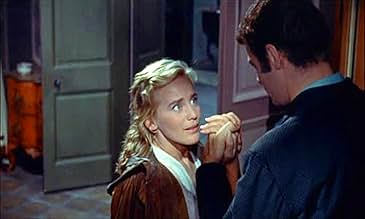Celebrated (and controversial) film historian/critic David Thomson considers Alexandre Astruc's "The Camera-Stylo (The camera as pen)" theory as being the most important one to have emerged over the years; it is understandable, therefore, that he champions UNE VIE – Astruc's 1958 adaptation of a Guy De Maupassant novel – as being as singularly important an achievement as Charles Laughton's THE NIGHT OF THE HUNTER (1955) or that I learned of the film's very existence in my teens via Thomson's thought-provoking tome "A Biographical Dictionary Of The Cinema" (conversely, "Leonard Maltin's Film Guide" dismisses it with a ** rating under its U.S. title of END OF DESIRE)! Like William Wyler's definitive 1939 adaptation of Emily Bronte's WUTHERING HEIGHTS, Astruc reportedly filmed only the first half of the novel so it may also not be accidental that UNE VIE shares with that earlier film a mistreated tragic heroine (a superbly delicate central performance from Maria Schell), brooding romanticism (Christian Marquand's husband is a self-loathing brute who betrays his wife with every woman who crosses his path) and a vivid depiction of landscape (exquisitely captured by Claude Renoir's luminous cinematography). The story per se could not be simpler as it details the tribulations that the waif-like Schell suffers at the hands of Marquand soon after their wedding: inhabiting an isolated country house, he first takes up with Schell's lifelong companion (Pascale Petit) in a nearby room, eventually impregnating the latter and looking on impassively as she gives birth in the forbidding snow!; later on, upon a chance encounter at a fair with his newly-married best friend (Ivan Desny), he strikes up a passionate relationship with the latter's own tantalizing wife (Antonella Lualdi) and with whom he shares a night-time clandestine barnyard encounter as Schell's visiting mother expires after falling down the stairs! Ultimately, the unrepentant lovers are literally driven to their death – thrown off a cliff in a mobile wooden bath-house by the furious Desny – despite Schell's own vain attempts to alert them of the impending calamity. Still, the ending is a hopeful one as the heroine regains a measure of dignity and happiness in the company of her own natural son and that of Petit and her daughter who come back to live with her in the same country house. I cannot finish off this review without mentioning Roman Vlad's remarkable music which impeccably underscores the film's intense and delicate mood swings.


























